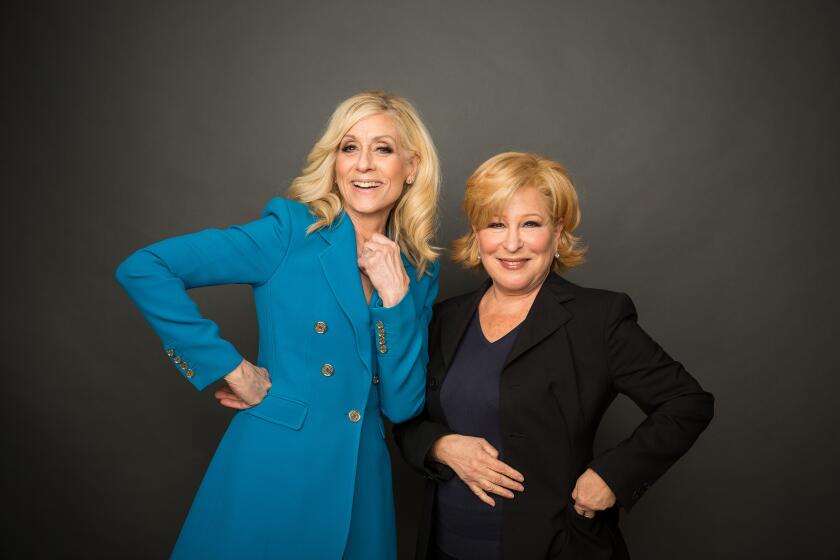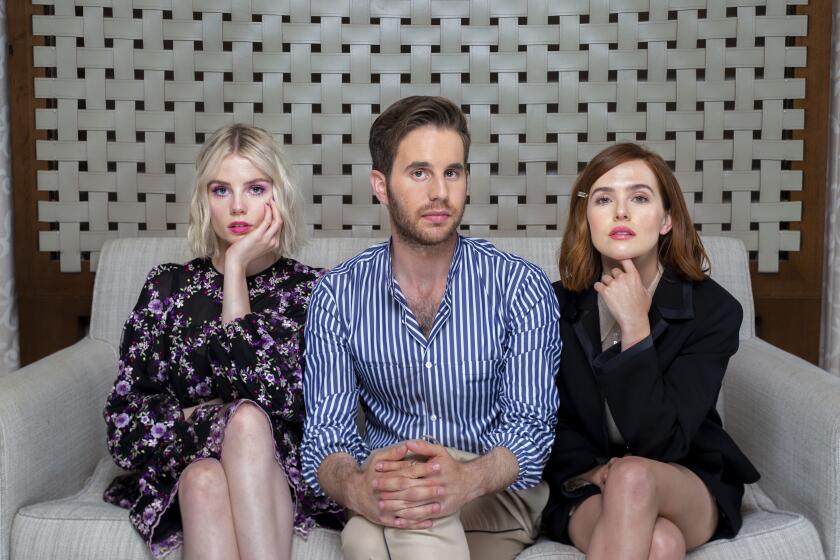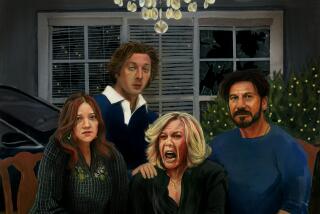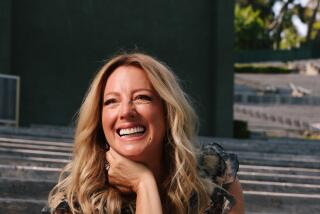Inside the New York piano bar that TV can’t stop singing about
The season finale of “The Politician” begins with Ben Platt at an upright piano. Though his character is now a student at New York University, he’s still visibly weathered by a student body election at his California high school. Disillusioned and depressed, he sits at the keys, dimly lighted by the strings of white lights above him, and sings Billy Joel’s “Vienna” to onlookers seated at tables and booths.
“That part of the show is his dark period,” said “Politician” production designer Jamie Walker McCall, who outfitted the Los Angeles locale Footsie’s for the single-day shoot. “So all the colors are desaturated and everything is a bit more sad.”
With a three-year time jump, the season finale of Netflix’s ‘The Politician’ introduces the stars of its next story line: Judith Light and Bette Midler.
The onscreen haunt is meant to be Marie’s Crisis, a show-tunes piano bar in New York City’s West Village. But Marie’s doesn’t have tufted booths or electric guitars, as the scene in “The Politician” does. (In fact, it doesn’t even have a working phone inside.) And though the Netflix series gets its red bar right — the one along the perimeter of the piano — its stools are rarely empty, even at its slowest hours.
Located on 7th Avenue and Grove Street, the beloved basement bar is bright and cheerful, with rainbow-colored string lights covering its low ceiling. It’s both a live-music venue and a bar, one that accepts only cash and serves mostly bottled beers and well drinks. The place is about the size of a conference room; its few chairs and tables are moved out after happy hour to accommodate the evening crowds, fresh from attending theater performances all over town.
Every day, show-tunes fans of all demographics gather at Marie’s to sing classics from Rodgers and Hammerstein and Cole Porter, as well as newer tunes from the likes of Jason Robert Brown and Lin-Manuel Miranda. Of course, the crowd splits for duets from “Little Shop of Horrors” and “Rent,” and “Les Miserables’” “One Day More” is always a four-part harmony. If it was ever sung in a stage musical, it’s fair game.
“Usually, in theater, the actors are telling a story to an audience, but here, strangers are singing these songs and telling a story together,” said Franca Vercelloni, a Marie’s pianist for 13 years. “Everybody gets involved and feels like they have a voice. It’s kind of special and comforting, especially in a crazy place like New York City.”

The magic of Marie’s Crisis is most accurately depicted in the TV Land series “Younger.” A Season 3 scene saw Miriam Shor’s tightly wound publishing executive introduce her go-to spot to a grieving coworker (Hilary Duff), and the two let go of their inhibitions by belting tunes from Disney musicals.
The show returned to the bar for a Season 6 episode, in which Sutton Foster’s character requested a rollicking sing-along to “9 to 5” (the Dolly Parton hit, also from the movie’s stage adaptation).
Marie’s Crisis has been featured in “Younger” twice because it’s a favorite of showrunner Darren Star. “He’s been there hundreds of times and has many fantastic memories of that place,” said series writer Dottie Dartland Zicklin. “He told us, ‘That’s where you go to let your hair down. It’s impossible not to smile and feel better when you’re in there.’”
“I’d never been there until we started shooting, and I remember getting there for rehearsal that day and being kind of like, this is it? It’s just a simple, square room. It’s so unglamorous,” said fellow series writer Eric Zicklin. “And then, a few hours later, it just warms up with people singing together. It was amazing.”

Shaking off the big city’s cold shoulder requires an expert piano player to keep the festivities going.
“It’s like being a choir conductor and an accompanist and a train driver at the same time,” said Vercelloni, who plays while sightreading from her iPad, mouthing the words so others can follow along, reading the response to the song in the room and thinking about which tune to play next. “It’s multitasking to the nth degree. Nothing ever stops. It’s thrilling on its best days but challenging when people aren’t singing.”
That scenario forces the pianist to play disciplinarian — as seen in the Season 3 finale of HBO’s “High Maintenance,” in which a patron seated in front of the piano insists on having a private conversation, rather than singing along with the group. Also shown in “High Maintenance”: Solos are at the discretion of the pianist, and usually reserved for regulars, special guests or the bar’s wait staff.
The bar’s depictions onscreen have led to larger crowds trying to get into the intimate space, with long lines that go around the block on weekends. The danger of the Marie’s Crisis boom, of course, is losing the charm that lured TV shows in the first place.
“We’ve talked about it — how do we preserve our ‘island of misfit toys’ family feeling while still keeping business going?” said Adam Tilford, a musical director who first met a friend for a drink at Marie’s 11 years ago, and has been a pianist there ever since. “It’s hard. We haven’t figured it out yet.”
In uncertain times, TV series like “Younger” are turning the romantic comedy on its head, rejecting notions like “happily ever after” and “one true love.”
The newer customers who come to Marie’s after seeing it on TV tend to disfavor songs from Stephen Sondheim or Kander and Ebb, numbers the regulars have requested for decades. Instead, they prefer songs from Disney classics, movie musicals or anything made famous by Idina Menzel.
“She’s great, but everybody else isn’t,” said Tilford with a laugh. “Especially when you have 30 or 40 women from Long Island or Iowa screaming it in your face. It hurts my head!”
Rather than observing the unwritten rules of the room, first-time patrons sometimes enter with an air of entitlement, and voice their favorites to the pianist soon after arriving. Sometimes they even demand a solo performance in honor of their birthday or upcoming wedding. Occasionally, they’re pretty rude about it.
“I once had a girl not only shout her request but then she crumpled up a $50 bill and threw it at me,” recalled Kenney Green, a Marie’s pianist of 12 years. “I took the money, gave it back to her and said, ‘You can throw that around and buy whatever song you want, but I think you need this money more than me, because you need to buy some class.’”
A sign behind the piano that bans selfies barely registers anymore, especially when someone like Lea Salonga, Jimmy Fallon, Darren Criss, Marc Webb, Jesse Tyler Ferguson, Andy Cohen or Michael Che is in the room. They arrive as incognito as possible and try their best to blend into the crowd. (Criss has even opened his own version of the piano bar concept, Tramp Stamp Granny’s, in Hollywood.)
“These people who come in now, they’re on their phones and taking video and Instagramming,” lamented Vercelloni. “When you’re here, you have to understand this is not just that cool place you saw on TV. It’s still a sacred space for a lot of people, and sometimes you just want to sing some songs and not be worried that someone is filming you.”
What she meant is that Marie’s Crisis is a lot of things. Yes, it’s that bar from that show. Yes, it’s built on the same land where Thomas Paine died.
And yes, when the West Village became the epicenter of the gay rights movement, Marie’s Crisis was a gay bar. Some patrons have been attending for decades, since the Stonewall riots took place across the street.
“Marie’s kind of parallels Pride in some ways,” said regular Tasso Bountouvas, who has been going to the bar for six years. “Yeah, it’s about a good time and having fun, but you should also remember how it came to be and what it started out as — a historically safe space.
“I’ve had the privilege of not having to deal with what previous generations of gay men have had to deal with and therefore needed a safe space,” he continued. “But when I’m singing there, it’s humbling. I feel like I’m honoring all those who need a place where they can be treated not as a label but as a person.”
Craven, ambitious, privileged, cruel: In “The Politician,” Ryan Murphy turns a high school election into a funhouse mirror of modern America.
That’s exactly how “The Politician” breakout Rahne Jones felt when she first went to Marie’s Crisis in 2016. The musical theater fan had just moved to New York City from Washington, D.C., and even though she didn’t know anyone at the bar, she went there every night and slowly made new friends. One of them was Bridget Kelly.
After regularly hanging out at Marie’s together, the two started dating, often ending up at their beloved bar after dinner or a show. So it was only fitting that Jones proposed to Kelly there — with their family and friends all around them, their photos temporarily decorating the wooden walls.
Everything came full circle for Jones in the season finale of “The Politician.” Though the opening scene was shot in Los Angeles, the next moment, with Platt and Zoey Deutch, was filmed outside the actual Marie’s Crisis, which was still open that night. The bar’s staff and regulars — people who have become like her family — were watching her from inside.
“It was my last scene of my first show ever, my first time really acting,” Jones recalled. “I was shooting right outside this place I call home, where I can be my true self, as gay as I want to be; where I went when I was absolutely broke and lonely; where I asked people for audition advice; where I met Bridget. That moment was very special.”
After wrapping production on that scene, Jones introduced Marie’s to the cast, and they sang show tunes until dawn. “It was,” Jones said, “the most perfect night.”
More to Read
The complete guide to home viewing
Get Screen Gab for everything about the TV shows and streaming movies everyone’s talking about.
You may occasionally receive promotional content from the Los Angeles Times.









